My daughter told a joke this week.
“What do you call a priest who becomes a lawyer? A father-in-law!”
She laughed so hard I couldn’t 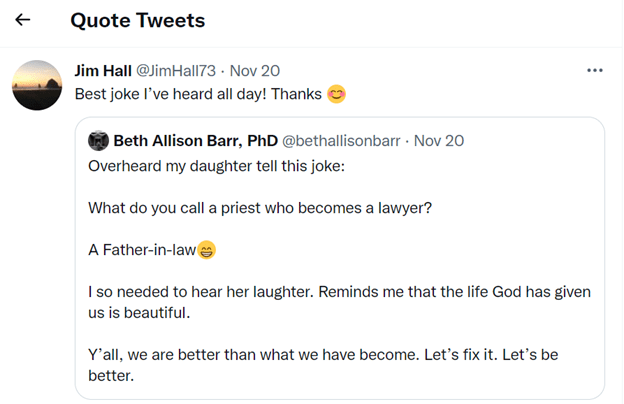 help but join her. It was a bright spot in my day and I shared it on twitter, just for a fun timeline cleanse. I was rather surprised when the joke received more than 21,000 views, 7 retweets, and 353 likes.
help but join her. It was a bright spot in my day and I shared it on twitter, just for a fun timeline cleanse. I was rather surprised when the joke received more than 21,000 views, 7 retweets, and 353 likes.
One comment caught my eye. Becky Castle Miller reminded that the punch line could also be mother-in-law since some Anglican dioceses ordain women. I just smiled. I was glad that point was made because it disrupts our usual association between “priest” and “father”. Yet I also knew this wouldn’t have occured to my daughter. She doesn’t know much about variations in Anglicanism. Her world, as an 11-year old child, is still too small.
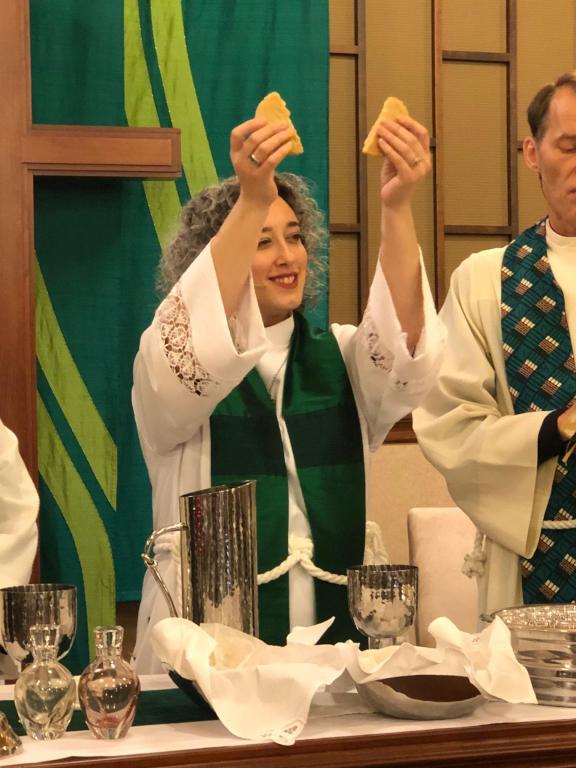
Just a few months ago (the week before The Making of Biblical Womanhood was published) I speculated about the small world of complementarianism. I told a story about the uncomfortableness of my students during a service at Canterbury Cathedral. I wondered if evangelicals might have a similar problem when it came to women in the church. Like my daughter’s joke, maybe conservative evangelicals just don’t have the ideological framework for female priests.
This is what I wrote:
“Despite the reality of women preaching and teaching throughout Christian history, many modern evangelicals continue to find women preaching uncomfortable. Just read Denny Burk’s initial response to my forthcoming book The Making of Biblical Womanhood: How the Subjugation of Women Became Gospel Truth. While insisting that complementarianism—the teaching that men are divinely ordained to lead and women are divinely ordained to follow—is not part of the gospel, he simultaneously insists that ‘history has proven that complementarianism is a second order doctrine that frequently implicates first order doctrines.’ The belief that women and men are equally called by God to both leadership and submission is, he suggests, dangerous to Christian faith. It leads away from the gospel. Pointing directly to my book, he writes that an ’embrace of egalitarianism goes hand-in-hand with a denial of inerrancy. More and more this embrace goes hand in hand with an affirmation of LGBT. These trajectories are not new. They are well-worn paths that discerning Christians will be wise to avoid and that faithful pastors will lead their flocks away from.’
…It strikes me that when medieval Christians heard stories about Mary Magdalene preaching, they heard how she led people to the Gospel instead of away from it. It also strikes me that the voices Burk elevated (in his recent article doubling-down on complementarianism) were all from a small circle of white males connected to The Council for Biblical Manhood and Womanhood. In stark contrast, three of the four voices he dismissed were women.
The discomfort of some of my students in Canterbury Cathedral stemmed from their lack of church experience. Their Christian world was too small. It had not prepared them for an Anglican church service conducted in a medieval cathedral. Could it be that complementarians like Denny Burk have the same problem? Could their equating of egalitarianism with a lack of discernment and biblical unfaithfulness stem from a too narrow understanding of church history?”
In other words, could the complementarian world just be too small?
I have been thinking a great deal about these words I wrote last April. The same day my daughter told her father-in-law joke, I read an article by Jonathan Leeman published in 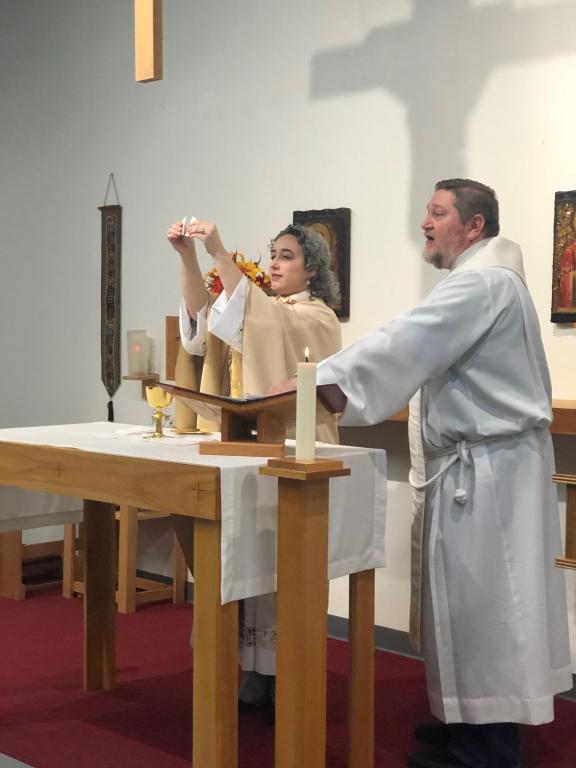 the 9Marks journal. For those of you who haven’t read it, it has this title: Editor’s Note: Defending Sound Doctrine Against the Deconstruction of American Evangelicalism. He argues that recent Christian scholarship by Kristin Kobes Du Mez, Jemar Tisby, Andrew Whitehead, Samuel Perry, Jacob Alan Cook, and myself are part of a “deconstruction project” that threatens “sound doctrine.” He encourages pastors to be on their guard against deconstruction “wolves” who “take a wicked delight in posturing as protectors of the hurt and in attacking you.” These wolves, he continues, “have managed to frame the conversation for the group. They’ve succeeded in exploiting real hurt for their church-dividing, power-loving ways. They remind you of the false teachers and scoffers described in places like 2 Peter and Jude, and they’ve managed to exacerbate the mental confusion and the spiritual state of the genuinely aggrieved, coming close to destroying any trust left remaining between these wounded sheep and the rest of the flock.”
the 9Marks journal. For those of you who haven’t read it, it has this title: Editor’s Note: Defending Sound Doctrine Against the Deconstruction of American Evangelicalism. He argues that recent Christian scholarship by Kristin Kobes Du Mez, Jemar Tisby, Andrew Whitehead, Samuel Perry, Jacob Alan Cook, and myself are part of a “deconstruction project” that threatens “sound doctrine.” He encourages pastors to be on their guard against deconstruction “wolves” who “take a wicked delight in posturing as protectors of the hurt and in attacking you.” These wolves, he continues, “have managed to frame the conversation for the group. They’ve succeeded in exploiting real hurt for their church-dividing, power-loving ways. They remind you of the false teachers and scoffers described in places like 2 Peter and Jude, and they’ve managed to exacerbate the mental confusion and the spiritual state of the genuinely aggrieved, coming close to destroying any trust left remaining between these wounded sheep and the rest of the flock.”
The wolves, in other words, like me.
In a twitter exchange with Kristin Kobes Du Mez, Leeman tried to claim he wasn’t actually calling us wolves; he was just using the scripture phrase that all pastors would be familiar with. Du Mez didn’t buy it. As she tweeted in response to Leeman, “You make so many unsubstantiated & incorrect assumptions throughout your piece & in this thread about me, my scholarship, & the discipline of history. If you must warn of wolves be precise & get your facts straight. If you are unable or unwilling to do so, leave off the wolf talk.”
I don’t think anyone else bought it either. Especially since he connected the wolves explicitly to “feminist literature”. Listen to what he said (and please go look it up for yourself).
“pastorally responding to the postmodern deconstruction project requires more than blasting the ideas at play. You and I must pastor real people who, sometimes, have been drawn to false teaching for understandable reasons.
Suppose, for instance, you’re counseling a married couple in which you conclude the man has been emotionally abusive with his wife. Meanwhile, she has been reading feminist literature which has convinced her that her marital problems root in her husband’s and your position on complementarianism. Therefore, she doesn’t trust you. In response, you want to scold him and comfort her. But you also want to warn her that her new-found feminism won’t afford the protection and justice and love she’s looking for. It’s a medicine that will provide short-term relief and long-term sickness. Your task, somehow, is to both confront him and point her to a different medicine. Doing the latter especially isn’t easy, since the abuse she’s experienced and the literature she’s reading conspire perfectly to burn down any bridge of trust between you and her. The slightest word of correction will be interpreted as “taking his side,” even if you stand with her 100 percent against his greater sin.”
Did you hear his words?
He called the husband’s sin of abuse the “greater sin,” implying that the woman’s reading of “feminist literature” is sinful too. He argues that the woman’s conviction against complementarianism (as a consequence of the deconstruction project) hinders his pastoral care and prejudices her against her abusive husband. In other words, just like Kevin DeYoung implied about my own abuse within his review of The Making of Biblical Womanhood, Leeman connects the abuse of a husband to the sin of his wife.
Shocking, isn’t it? This is what I tweeted in response: “I wrote #MakingBiblicalWomanhood to help the women who live every day in situations just like @JonathanLeeman described…The women who are met with patronizing attitudes and gaslighting techniques when they try to get help from abusive husbands. The women who are told that believing God calls women to lead and serve in the same ways as men is sinful and will lead them astray from gospel truth. Y’all, these women are my audience. My heart breaks every day for them because I lived in their shoes for so long. Because I know the Bible doesn’t teach what they are being taught. The gospel is bigger than this. Jesus is better than this.”
Kyle J. Howard, after seeing my response to Leeman, tweeted his assessment of the pastoral advice. “I consider the statement above by 9marks to be ministerial & soul care malpractice,” he wrote. “To take advantage of the sacred space of counseling & pastoral trust to try & push an agenda regarding Complementarianism, especially in the midst of abuse is abhorrent.” Howard is a historical theologian, preacher, and Christian counselor who specializes in trauma informed soul care. Even if Leeman ignores my voice, he should listen to Howard’s.
But I don’t think he will.
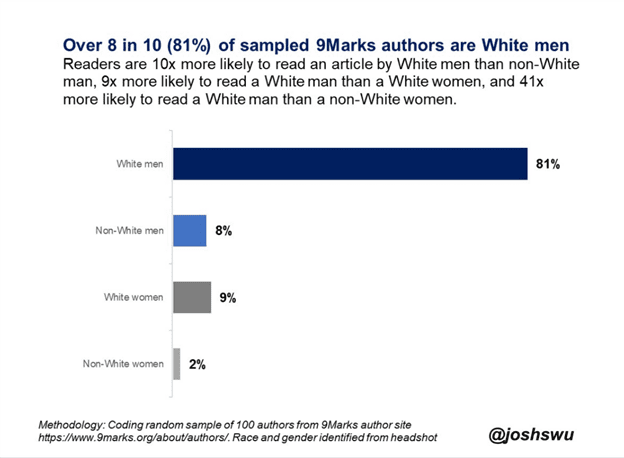 You see, I think Leeman’s world is just too small. Joshua Wu, who holds a PhD in political science and works in data science analytics, made this interesting statement. “Perhaps @9Marks critique of @kkdumez, @JemarTisby, @bethallisonbarr, @ndrewwhitehead/@socofthesacred, and @jacookphd about how Whiteness and patriarchy distort Christianity would be better if they were more diverse. 81% of writers are White men & 1in10 are women or non-White.” Wu makes this claim from his coding analysis of a random sample of 100 authors from the 9Marks author site. He continues that, “readers are 10x more likely to read an article by White men than non-white men. 9x more likely to read a White man than a White woman, and 41x more likely to read a White man than a non-White woman.” Not only are the authors of 9Marks articles mostly white men; but their readership mostly prefers white men too.
You see, I think Leeman’s world is just too small. Joshua Wu, who holds a PhD in political science and works in data science analytics, made this interesting statement. “Perhaps @9Marks critique of @kkdumez, @JemarTisby, @bethallisonbarr, @ndrewwhitehead/@socofthesacred, and @jacookphd about how Whiteness and patriarchy distort Christianity would be better if they were more diverse. 81% of writers are White men & 1in10 are women or non-White.” Wu makes this claim from his coding analysis of a random sample of 100 authors from the 9Marks author site. He continues that, “readers are 10x more likely to read an article by White men than non-white men. 9x more likely to read a White man than a White woman, and 41x more likely to read a White man than a non-White woman.” Not only are the authors of 9Marks articles mostly white men; but their readership mostly prefers white men too.
It is such a small world.
It seems rather striking to me that some of the most strident criticism of The Making of Biblical Womanhood stem from white men who represent three of the most conservative evangelical groups associated with complementarianism: The Council for Biblical Manhood and Womanhood, The Gospel Coalition, and 9Marks. Did you know that all three of these groups are connected? Mark Dever (co-founder of 9Marks), for example, is a leading complementarian who writes for The Gospel Coalition and the Council for Biblical Manhood and Womanhood; he also endorsed Recovering Biblical Manhood and Womanhood edited by Wayne Grudem (former president of the CBMW) and John Piper (founder of desiringGod.org and council member of the Gospel Coalition); Dever is also a council member for the Gospel Coalition. BTW–all three of these groups, along with Mark Dever, are also connected to Mark Driscoll (for those of you listening to the Rise and Fall of Mars Hill). For those of you keeping score, Jonathan Leeman, who wrote the article implying I was a wolf, is the editorial director for 9Marks. Such a small, small world.
I confess, the deafness of this small group of complementarian men astounds me. How can they not see how wrong and harmful it is to assume an abused woman is complicit in the sin of her abuser because she reads literature that disagrees with complementarianism? How can they make patriarchy such a central component of the gospel that they cannot hear the cries of women who have been harmed by it? How can they smugly dismiss the evidence presented by so many scholars as an attack on Christianity rather than evidence of how corrupt Christians have become?
Rather than rely on the assessment of men like Leeman, I would like to let you see my concerns about 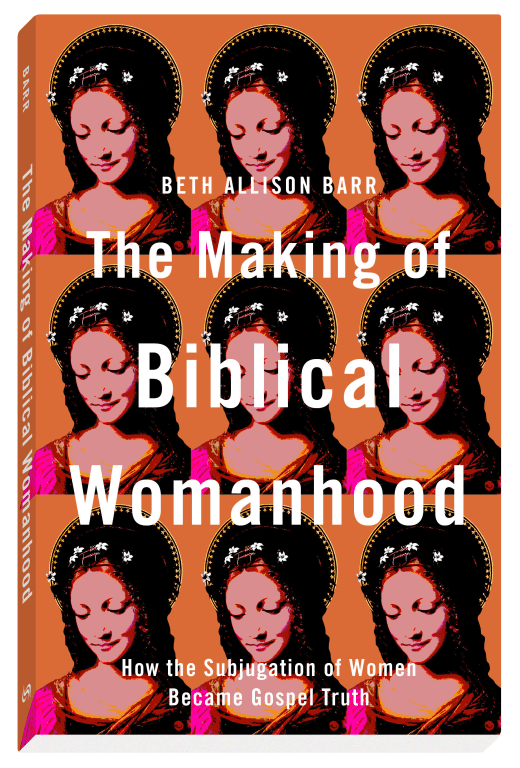 the small world of complementarianism. I would like you to understand why I am so concerned about Jonathan Leeman’s pastoral advice for an abused woman. This is from the final chapter in The Making of Biblical Womanhood, p. 207.
the small world of complementarianism. I would like you to understand why I am so concerned about Jonathan Leeman’s pastoral advice for an abused woman. This is from the final chapter in The Making of Biblical Womanhood, p. 207.
“We can no longer deny a link between complementarianism and abuse. So much evidence now exists that John Piper, Al Mohler, and Russell Moore have gone on the defensive, trying to proclaim how their ‘Christian patriarchy’ is different (see my first chapter). Kristin Du Mez eviscerates their claim, providing the proof my friend could not see–that the conservative church model of authoritarian leadership combined with rigid gender roles fosters a culture of abuse (decade after decade, church after church, leader after leader). Does this model hurt everyone? Of course not. It just hurt the thirty or more women who made allegations against Bill Gothard. It just hurt the victims who filed a class-action suit against Sovereign Grace Ministries for creating an environment in which, they alleged, the sexual abuse of children flourished. It just hurt the seven hundred victims of sexual abuse linked to Southern Baptist churches over a period of twenty years.
It just hurt women like me.
Conservative evangelicals preach ‘a mutually reinforcing vision of Christian masculinity–of patriarchy and submission, sex and power,’ Du Mez writes. ‘It was a vision that promised protection for women but left women without defense, one that worshiped power and turned a blind eye to justice, and one that transformed the Jesus of the Gospels into an image of their own making.’ Not only do legal cases and newspaper reports and victim allegations tell us that Du Mez is right, but my own life bears witness. Hierarchy gives birth to patriarchy, and patriarchy gives birth to the abuse of both sex and power. I will never forget the words of Gwen Casados, who lost her daughter Heather to a drug overdose fourteen years and one suicide attempt after she was sexually molested as a teenager in her church choir room. ‘I never got her back,’ her mother said.”
As for my daughter, she is still growing and learning. Her world will just get bigger. She already knows that women preach; one day she will know that women are priests too. I confess I have lost this hope for many complementarians. Instead of getting bigger, their world has done the opposite. Instead of centering the gospel, they have centered patriarchy and whiteness. Instead of embracing their brothers and sisters in Christ despite theological disagreements, they have labeled us as wolves and accused us of destroying the faith. Their world has shrunk so small I fear they can no longer see beyond it.
Let’s just pray I am wrong.













